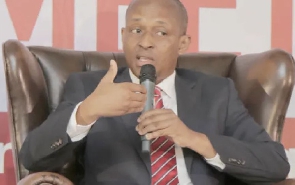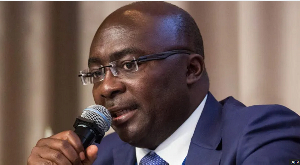Vish Ashiagbor, Country Senior Partner for PwC Ghana, has urged the business community to exercise caution ahead of 2024 as he believes the year could be challenging.
Reflecting on the fiscal policies outlined in next year’s budget, Ashiagbor noted that despite relative stability, navigating through 2024 will demand vigilance and adaptability from stakeholders – particularly businesses.
“The environment is better than it was in 2022. The improvements or relative stability that we’ve seen in 2023 will hopefully continue, but we’re by no means out of the woods. So, let’s brace ourselves for a tough 2024,” Mr. Ashiagbor remarked during an interview with B&FT at the 2024 budget review.
His assessment is against the backdrop of government’s emphasis on fiscal consolidation while maintaining a growth-oriented approach.
The budget review highlighted key aspects of the fiscal policy, emphasising the restoration and sustenance of macroeconomic stability and fiscal sustainability over the medium-term. It focused on progressively improving fiscal balance through revenue enhancement, expenditure rationalisation and critical structural reforms.
However, Ashiagbor pointed out challenges – particularly in terms of tightening tax compliance while stimulating business growth. “Tightening tax compliance while stimulating business is challenging given the current circumstances.”
Government’s medium-term revenue strategy (MTRS) for direct taxes aims to expand the tax base and minimise tax avoidance. In 2024, government is targetting direct tax revenues of GH¢65.81billion; representing a 26.95 percent growth over the projected outturn for 2023. To realise this revenue target, various tax policy measures have been introduced to complement existing strategies.
Government proposes to make the Commissioner-General’s certified invoice the basis of all deductible expenses for income tax purposes. This initiative initially surfaced through an internal memo during 2021, in which the Ghana Revenue Authority (GRA) instructed staff to only approve corporate income tax reductions beyond GH¢2,000 if they were supported by value added tax (VAT) invoices.
“For this proposal to achieve its intended objectives, it is essential to broaden the current project’s scope to encompass all businesses. Failing to do so could have an adverse impact on smaller businesses which do not need to register for VAT,” PwC stated in its review of tax measures in the 2024 budget.
It further said: “The crux of the matter lies in whether amending Act 896 to incorporate this new requirement is justified. While the measure may enhance transparency and accountability, it may introduce an additional layer of complexity for taxpayers and also push small enterprises out of business. Government can also explore other ways of addressing these challenges, including providing a reasonable threshold to apply the rule”.
The budget’s broad focus, centred on fiscal consolidation to reduce the revenue-expenditure gap without compromising growth, was acknowledged. Sectors such as industry, agriculture and services – impacted heavily in 2023 – are projected for recovery in 2024.
Business News of Thursday, 23 November 2023
Source: thebftonline.com
Businesses urged to brace for 2024
Entertainment
















